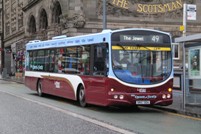
Pence per kilometre change alongside 20% cut to BSOG could mean up to 40% cut for urban operators
CPT Scotland claims Scottish operators, particularly those running services in urban areas, face a huge hit through forthcoming changes to BSOG.
The Scottish Government announced in December the budget for BSOG in 2012/13 will be set at £50m from April this year, compared to the previous amount paid in 2010/11 of £62.5m, which amounts to roughly a 20% cut, Paul White, public affairs executive for CPT Scotland, told CBW.
The mechanism through which BSOG is paid will also fundamentally change from pence per litre to a pence per kilometre model, which will also no longer include any positioning mileage.
The government had also proposed the introduction of a £3m Bus Investment Fund for which operators and local authorities could put in match-fund bids. “This is good to see but the funds to pay for it have effectively been taken out of BSOG when the government should really be allocating new money to such schemes,” said Paul.
“The Scottish Government claims it is protecting rural routes and rural operators, however urban operators will take a big hit. BSOG is being cut by 20% but because of the accompanying pence per kilometre change the reality is a cut of up to 40% for them.
“While the government is correct in saying some operators will be no worse off, it is the urban operators with shorter, more congested routes who will be markedly worse off and it these operators who carry the most passengers. It is the passengers who will feel the blow.”
Speaking at a debate on public transport on January 26, transport minister Keith Brown said: “Why are we changing the scheme? BSOG payments currently track the amount of fuel each operator uses, and more fuel means more subsidy. So, we are removing fuel from the calculation and substituting route length. We are also taking away payment for dead mileage, when there are no passengers at all on the buses. We believe those moves will incentivise greater fuel efficiency and emission reductions; they will also tend to benefit rural services, providing a degree of protection for our vulnerable rural communities.”
He added: “We are reducing the BSOG funding to £50m, but we are adding a £3m investment fund for bus infrastructure. The reduction represents about 1% of fare costs. It does not justify significant fare rises or withdrawal of services.”
Paul concluded: “CPT Scotland has pointed out it was the wrong time to attempt to introduce bus investment fund while making such funding cuts to BSOG. The Scottish Government has since decided the £3m pot will be shared out to operators whose BSOG is being cut by more than 15% on a pro rata basis in the first year of the new scheme. What sticks in the throat is the cut and change in mechanism are being introduced concurrently and at such short notice.”


